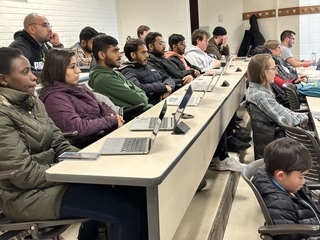Commitment to Diversity and Inclusion
The CQD-MQD is committed to creating and sustaining an environment of diversity, civility, and intellectual discovery. The policies of the participating institutions do not tolerate harassment or any other form of discrimination on the basis of race, religion, sex, age, national origin, disability, sexual orientation, or gender identity and expression. Everyone has the right to feel safe and respected, regardless of their background or identity. An inclusive environment is crucial for successfully pursuing our mission on behalf of the National Science Foundation.
Innovation thrives in an environment where diverse perspectives are valued and respected. Therefore, we are committed to creating an inclusive workplace where everyone feels welcome and valued. We do this by ensuring consistency in our employment practices, promoting collaboration, and fairness. Furthermore, the Diversity, Equity, & Inclusion (DE&I) Offices at the participating institutions are committed to ensuring world-class research and education by creating a diverse, equitable, and inclusive workplace, as follows:
1. Facilitating the development of a pipeline of qualified, diverse candidates.
2. Ensuring equitable treatment for all employees and participating members.
3. Creating an environment that encourages respect for individual differences through inclusivity.
4. Compliance with participation in diversity training sessions.
We are committed to creating a diverse and inclusive workplace by following principles and policies that are foundational to our research and educational goals including:
1. Anti-Sexual Harassment Policy: This policy prohibits all forms of sexual harassment, including unwelcome sexual advances, requests for sexual favors, and other verbal or physical conduct of a sexual nature.
2. Veterans Support: All veterans will be treated fairly and equitably in the workplace. It prohibits discrimination against veterans on the basis of their military service, or veteran status.
3. Equal Opportunity & Affirmative Action Policy: This policy prohibits discrimination on the basis of race, color, religion, sex, national origin, age, disability, sexual orientation, or gender identity. It also requires us to take affirmative action to ensure that all qualified individuals have equal opportunities in employment.
4. Respectful Workplace Policy: All forms of harassment, including verbal, physical, and visual harassment are prohibited. It also requires us to create a workplace where everyone feels respected and valued.
5. Anti-Retaliation Policy: This policy prohibits retaliation against anyone who reports or complains about discrimination or harassment.
6. Workplace Lactation Program: Employees who are breastfeeding or pumping breast milk have access to a lactation room and lactation breaks.
We are committed to enforcing these policies and to creating a workplace where everyone can thrive.
In particular, the CQD-MQD is committed to attracting and retaining a diverse workforce of early-career and postdoctoral researchers. To this end, we will establish the following initiatives, including:
1. A memorandum of understanding (MOU) with minority-serving institutions (MSIs) to foster collab- orations with faculty members and develop student access.
2. Workforce development through the STARS program that will provide opportunities for new undergraduate and graduate students to gain experience and skills in STEM fields.
These initiatives are designed to create a pipeline of diverse talent and to ensure that the CCI program is a welcoming and inclusive environment for all participants.
Strategies for Enhanced Recruitment
Our recruitment of graduate students and early-stage investigators (postdoctoral researchers and visiting scientists) will include careful selection through enhanced hiring practices that encompass interviewing, onboarding, and comparative evaluations that enhance equity for individuals from diverse backgrounds and groups historically underrepresented in the research community. When seeking candidates for postdoctoral positions, all principal investigators will include minorities and women in their candidate pools. This will be done through outreach at minority-serving institutions (MSIs) and cultivating existing professional networks.
Our groups include faculty members from diverse backgrounds and groups historically underrepresented in the research community (Wilson, Narang, Santos, Hendrickson, Whitfield, Batista). All participating faculty work to maintain a balanced representation of members from historically underrepresented groups, and we are committed to continuing to recruit and retain a diverse workforce of early-career researchers through the following strategies for creating and sustaining a positive, inclusive, safe, and professional research environment:
1. Foster a psychologically safe and respectful workplace. PIs will use existing policies, training, and code of conduct to create a workplace where all staff, users, students, guests, and visitors feel safe and respected. This includes being free from discrimination, harassment, and microaggressions.
2. Ensure frequent communication among all staff. Weekly group meetings will serve as a forum for staff to share early results of ongoing research, discuss challenges, train on oral presentations, and learn about other projects in related scientific fields. This will help to build relationships and create a sense of community among staff.
3. Host regular informal meetings. The research groups will hold a weekly social coffee hour, as well as an annual retreat, attended by leadership, staff, postdoctoral researchers, students, and users. These regular informal meetings will foster communication among all participants.
4. Support social and professional events to provide opportunities for staff to connect with each other and build relationships.
5. Staff satisfaction surveys: We will survey the participating members of the research groups to assess their satisfaction with the workplace environment.
6. Retention rates: We will track the retention rates of staff from underrepresented groups.
Resources
| Office of Diversity and Inclusion | Affinity Groups |
| Diversity and Inclusion | WorkLife |
| Inclusive Pedagogy | Workplace Survey |
